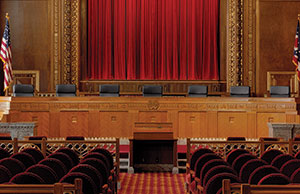Supreme Court to Hear Arguments in Seven Cases April 23-24

The Chief Justice and Justices of the Ohio Supreme Court will hear oral arguments in seven cases on April 23 and 24.

The Chief Justice and Justices of the Ohio Supreme Court will hear oral arguments in seven cases on April 23 and 24.
A Warren County man seeking to seal the record of a domestic violence protection order that was entered against him in 2009 but dismissed a few weeks later will ask the Ohio Supreme Court next week to overrule lower court decisions that refused to seal his record on the basis that the legislature has not enacted a law that specifically allows trial courts to expunge civil, rather than criminal, sanctions.
The case, Schussheim (n.k.a. Henneman) v. Schussheim, is one of three that will be heard by the court on Tuesday, April 23 at the Thomas J. Moyer Ohio Judicial Center in Columbus.
The court’s Office of Public Information today released summaries of those cases, and four additional cases the court will hear on Wednesday, April 24, when it convenes in a special off-site session in Bellefontaine.
In addition to Schussheim, the cases to be argued on Tuesday in Columbus include:
- In Re Complaint of Smith v. Ohio Edison Company, which involves a consumer who made repeated phone calls to a utility company requesting that the electric service account at a property he had purchased in Warren be transferred to his name. The complainant disputes a ruling by the state Public Utilities Commission that the power company was not required to give him written notice before it disconnected service to the property because he had not completed a written application to establish service as a “new” customer.
- In Columbus Bar Association v. Gill, an attorney who has admitted violating multiple provisions of the Rules of Professional Conduct in his dealings with seven different clients asks the court to impose a sanction less severe than the indefinite license suspension recommended by the Board of Commissioners on Grievances & Discipline.
The four cases to be argued on Wednesday in Bellefontaine are:
- Pauley v. City of Circleville, which involves a personal injury suit filed by a high school student and his family based on injuries the plaintiff suffered when he collided with a snow-covered piece of construction debris while sledding in a city park. The plaintiff asks the court to overturn lower court rulings that the city owed no duty to protect him from injury while using the park because he was a “recreational user” of the property.
- In State v. Kareski the court is asked to decide whether a trial court’s procedural error in “taking judicial notice” of a required element of a criminal offense, rather than requiring the state to present admissible evidence proving that element at trial, allows the state to re-try the defendant or bars a new trial based on the defendant’s constitutional right against double jeopardy.
- In Mahoning Education Assoc. of Developmental Disabilities v. State Employment Relations Board, the state challenges a ruling in which the Seventh District Court of Appeals held that a provision of Ohio’s public employee collective bargaining law is unconstitutional. The court of appeals found that a provision of the law violates the free speech rights of government employees and their unions because it requires them to give an employing agency ten days’ advance notice before conducting informational picketing, whereas any other citizen or group is free to engage in picketing of a government agency without being required to provide advance notice.
- Mann v. Northgate Investors LLC involves a personal injury suit filed by a guest at a residential apartment complex who was injured when she stumbled and fell while descending a dark interior stairway in which the lighting fixtures were not working. The landlord asks the court to overrule a decision of the Tenth District Court of Appeals rejecting his argument that he is immune from liability for the guest’s injuries because an unlighted stairway is an “open and obvious” hazard from which a landlord owes no duty to protect a non-tenant of the building.


